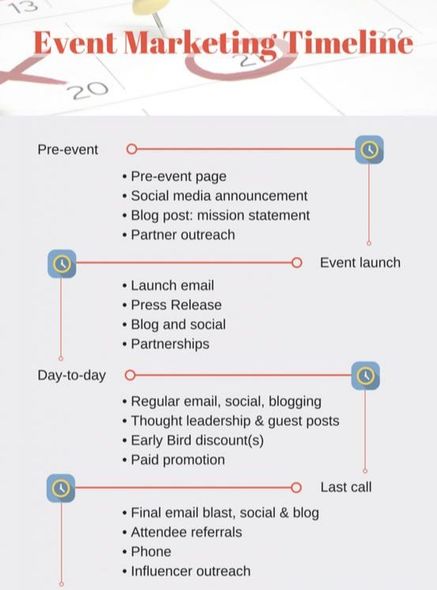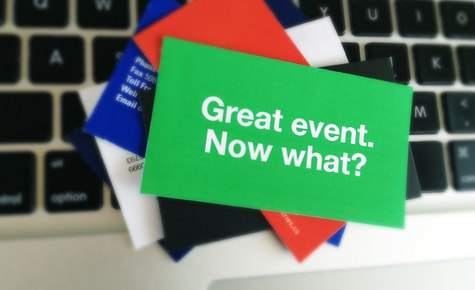 If you expect a great event, you need good pre-event promotion. While different organisers participate in different activities, there is a plethora of activities you can get involved with to maximise your results before the event. Check out the show guides: A review of your exhibitor manual will normally highlight opportunities available for your particular show, and is normally a good starting point. Show guides, catalogues and preview guides should all carry your news and company information. In the majority of instances these are non-chargeable and a good way to get your name out in advance of the show. Send invites: Ask for invitations which you can sometimes customise with your logo and send some to valued contacts; give hard copies to your sales team/agents/distributors to pass out and keep more in your reception area. VIP tickets are often a valuable way to entice more visitors to your stand. Run adverts: In terms of advertising, find out the schedule (discounts) and channels the organisers are using - dovetail any advertising for your business with the places where they are running previews and/or features on the show. Use flashes and banners across your ad - "See us on stand no: 66". Be creative. Why not amend your social media profiles with the same info - and your email signatures too? Make contact with the press: Do the organisers use a PR agency? If so, use their services and pick their professional brains (and contacts). Get a press list of contacts and deadlines. If you have a company newsletter, milk the opportunity. Do mail shots and e-shots to key clients, existing, potential and past customers. Make sure as well that you have information on your website and that the show site links to yours. Pre-book appointments: Finally, remember many events will set up a diary or appointment system. Pre-book as many appointments as possible so you can predict traffic and busy periods. Not all will be adhered to, but at least a plan subject to change is better than none at all!
0 Comments
 There are some terrifying sets of figures floating about the industry suggesting 62% of leads are not followed up after an event. The fact that any are neglected seems at best embarrassing and more poignantly, rather pointless. It is the equivalent of walking into shop, paying for your goods and walking out without your purchase. Unsurprisingly, everyone I know says that they do follow up after an event. The question then perhaps should be, do they follow up effectively? Effective follow-up Think about your visitors and what they are used to. Would it be better to hire a light-pen and scan their badges or use a laptop to manually input their details? Many exhibitions now employ QR codes so that exhibitors and visitors can exchange details with people they meet as they go. However, at some consumer shows visitors do not have badges or business cards, so a manual system may be best. Remember, the quicker and easier it is for you to capture their details, the smoother and more pleasant it will be for your visitor. Record also any special details and timescales, who else they are considering and make a note of any buying cycles or budgets. Amongst the best systems I have seen are those which additionally categorise their leads into some sort of urgency list - for example, hot, warm and cold. In this way when the leads are being followed up (and let's face it, often it is not the stand personnel who subsequently follow up) the salespeople know whom to contact first. A good tip is to ensure everyone involved understands and adheres to the same definitions of hot, warm or cold or a scale of one to ten. When then should you follow up? Smarter exhibitors, who are more on the ball than most, follow up their leads whilst the show is happening, rather than waiting until the dust settles afterwards. All you need do is prepare a standard letter or email in advance of the event, which suits most enquiries, thanking them for visiting your stand that day and promising that a named individual will contact them within the agreed timescale. These could be sent out at the end of each day to all of your stand visitors. If you wish to do your bit for the environment, you can also use this opportunity to direct them to your website or email a PDF brochure in the appropriate format for them to look at rather than sort through their over-stuffed carrier bags for your literature. Once the show is over, by all means copy, analyse and input your data, but you should also ensure a copy goes straight to the sales team. Some of the leads may be so hot that a more switched-on (or less analytic) competitor could steal a march on you whilst you are still debriefing and sorting your prizes. Most leads gathered will be hot and need to be followed up within three or four days of the event. Some can wait, but an acknowledgement or commitment to the next step should also be agreed within those post-event days. Research suggests that we should be prepared to follow up six times before a lead converts - an email, a PDF, a phone call, an appointment and a follow-up call perhaps. Whether you’re attending a networking event down the street, a trade show in Vegas, or a major industry convention in London, you need to have a focused post-event follow-up plan in place ahead of time. Here’s how to get started: Clear space on your calendar for follow-up The faster you follow up, the more likely people will remember you. Set aside time post-event to write emails or make phone calls. If you attend a local networking event, follow up within 24 hours. If you attend a large trade show or convention, follow up with 2-3 days of arriving home. Choose a goal What do you want to happen when you reach out to people in your follow-up? Do you want to set up meetings with potential clients? Schedule demos? Remind them to purchase your newly published book? Your goal will determine your message, which brings us to... Write an attention-grabbing message Whatever you write or say needs to grab their attention, so focus on them. How will your services or products make their lives easier/better? Why should they buy from you? What benefits will they get? Keep the message short and to the point. If you’re sending out a mass email, spend a lot of time on the email subject line to ensure your email gets opened. Make an ask Based on your goal, make your ask very specific. Tell them what you want them to do, and make sure it’s easy for them to do it. If you include a link to the contact page on your website, make sure the link works! Set up an automated email campaign If you’re using email for follow-up after a large event, definitely set up an automated email campaign. Send them valuable information in each email, like a case study, ebook, infographic, or special offer, like a free consultation.  Holding your own event is a good way to show your product or service in a tailor-made setting without the distraction of other exhibitors. Holding a private exhibition often has an exclusivity that is appealing to your invited guests. With a custom event you control everything, from the venue to the timing. The good news is that you and your business are in the spotlight - but the bad news is, if you get things wrong, there's nowhere to hide. Choosing to produce your custom event A custom event can be anything from a shop opening to an art exhibition. You can host product demonstrations in a hotel suite or hold seminars in a meeting room. You can devise a roadshow or hold an open house at your premises. In short, you can create an event that exactly matches your needs and the needs of your target market. Holding your own event enables you to reach prospective customers direct. This can be useful if your products are usually sold through a network of distributors. As well as showing off your wares, customers can meet the person behind the product, whether you're an artist, an inventor or an entrepreneur. Tailor-made events are useful to demonstrate expertise. Law firms, accountancy firms and financial advisors, for example, can attract potential clients by holding seminars that explain issues and offer solutions. It's a good idea to produce your own event if your customer base is predominantly local - they may not travel to established events that are further afield. Set the tone of the event in advance. Some customers prefer an appointment-based event, giving them a chance to get a hands-on product demonstration and personal attention. Others prefer the buzz of a well-attended event where there are opportunities for networking. Ensuring a good turn-out is one of the biggest challenges. Customers need a good reason to attend. One option is to take your event to them. If your audience are young people, for example, hold your event in a shopping centre on a Saturday afternoon. If they're parents, try a family-friendly weekend event in a local park or school playing field. Planning your own event Producing your own event isn't easy and requires forward planning. It's vital to decide what you want to achieve and who you want to attend. Be realistic about your objectives and set a budget - costs can quickly escalate. You may be able to borrow good ideas from established exhibitions for your own event. If you need ideas or assistance, the International Confex exhibition is the place to meet experts and suppliers from the events industry. It can be hard to attract visitors to a small event. You could run a joint event with a complementary partner to make a bigger impact and bring in more visitors. Alternatively, you may decide that it would be more effective to take your products to your customers rather than expecting them to come to you. The success of your event certainly depends on getting the right people to attend. You need to make your event attractive and convenient for your target audience. Send personal invites and customised direct mail with compelling reasons to come along. Exclusivity is a good incentive and holding a private sales event or an invitation-only launch can be a good strategy. Sending invitations should be part of your promotional strategy even if your event is open to all. You should send special invitations to key decision makers and local VIPs as well as loyal customers, new prospects and the media. Distribute a press release in advance to get coverage of the event. Managing the event The logistical challenges of running an event are considerable. You have to find the right venue and organise catering. Other important issues are signage, seating, audio visual facilities, lighting, display stands and promotional literature. You must establish whether you and your staff are capable of producing a successful event or whether it would be better to use an events company. On the day, you need to be visible and make time to meet and greet. People often come to these events specifically to make contact with the person behind the product or service so you need to ensure you speak to all the key guests. Brief your staff so they can answer queries and be ambassadors for your business. Goodwill gestures are often appropriate. You could give guests a free sample or a branded promotional item. Offering deals and discounts can be a good way to attract customers and make sales on the day. Dos and don'ts when holding your own event or exhibition Holding your own event allows you to communicate your message and demonstrate your product or service in front of a select audience of invited guests without competition from other exhibitors. Get it right and you can show your business in the best possible light, but if you get things wrong there's nowhere to hide Do
Don't
If you need assistance with any form of event planning or management then get in touch with us today, this is an area we excel at and can help organise any type of function from small to large.  Exhibitions and events are valuable because they allow face-to-face communication and offer opportunities for networking. Exhibitions enable you to meet the people that matter to your business in one place, including existing customers, new prospects, suppliers, advisers, investors and key figures in your industry. Exhibitions come in all shapes and sizes, but the two main types are consumer shows and trade fairs. There are events for every sector and profession and for many small businesses these are a crucial part of their marketing strategy. The benefits of exhibitingMany forms of marketing, including telemarketing, advertising and direct mail, involve intruding on customers which can cause resentment. Not so with exhibitions. Customers go to events prepared to give their time and attention and are often ready to buy. Face-to-face meetings mean that you can have a conversation with customers. As well as presenting your products and services, you get the opportunity to find out more about your customers and their needs. You can use exhibitions to carry out valuable market research. Trade shows attract qualified visitors and the majority often have buying responsibility. Indeed, trade fairs attract those people who can be difficult to get hold of at other times. Many arrive with credit card in hand and will have done their homework beforehand. Consumer shows can be a great launch pad for a new business or product and also offer the chance to do live demonstrations in front of a large audience. Press attention and the power of word of mouth means that you can create a real buzz about your product or service. As well as making sales, exhibitions can be used to forge new relationships, strengthen existing alliances, build databases, generate positive PR, recruit new staff and build your brand. Exhibitions and events also offer you the chance to keep up with industry developments. They can give you a snapshot of what's new, and you may get access to the movers and shakers. What's more, they are a good opportunity to keep an eye on the competition. Exhibiting checklistExhibitions can be a great place to meet potential customers face to face. Here are the key steps to exhibition success.
Creating your own networking opportunitiesYou don't necessarily have to be an exhibitor to get face-to-face contact with key prospects. For instance, it's worth going to exhibitions as a visitor. You get to meet large numbers of useful people in one place. To choose the right event, contact your trade association or local Chamber of Commerce and talk to your customers about which events they attend and why. To make the most of the opportunities, it's worth planning ahead and fixing some appointments. Another option is to create your own opportunity, such as a launch party or a product demonstration. Holding your own event is a good way to show your product or service in a tailor-made setting without the distraction of other exhibitors. You can create an event that exactly matches your needs and the needs of your target market. Networking is an important part of the marketing mix for small businesses. You can use networking to forge productive relationships with key people. Over time, these contacts can become powerful advocates that support and promote your business. There are many opportunities to meet the right people. Become an active participant in the local community and attend events aimed at your sector. Your local Chamber of Commerce will be able to point you in the right direction. There are also plenty of ways to network online that can help build valuable business relationships. In particular, there are sector-related groups on LinkedIn and Twitter that allow small business owners to link up with contacts, suppliers and customers. Whether online or in person, the best way to approach networking is to be helpful, likeable and knowledgeable. That way you create goodwill, an essential basis for any business relationship. |
AuthorLisa Hunter is an experienced Marketing, Events and Project Manager. She has over 10 years’ experience working in the IT and marketing industry, delivering strategic marketing support and managing creative projects for a wide-range of clients. In this blog she shares her knowledge and experiences…we hope you enjoy it. Archives
June 2019
Categories
All
|
 RSS Feed
RSS Feed